Key takeaways:
- Spectrum licensing is essential for efficient radio frequency allocation, impacting service quality and innovation in telecommunications.
- Challenges include regulatory changes and competing claims, which can hinder project progress and require effective stakeholder communication.
- Collaboration and networking within the industry are crucial for overcoming licensing issues and fostering a supportive environment.
- Future developments in technology necessitate adaptive licensing strategies to accommodate increasing demand and emerging innovations like 5G and IoT.
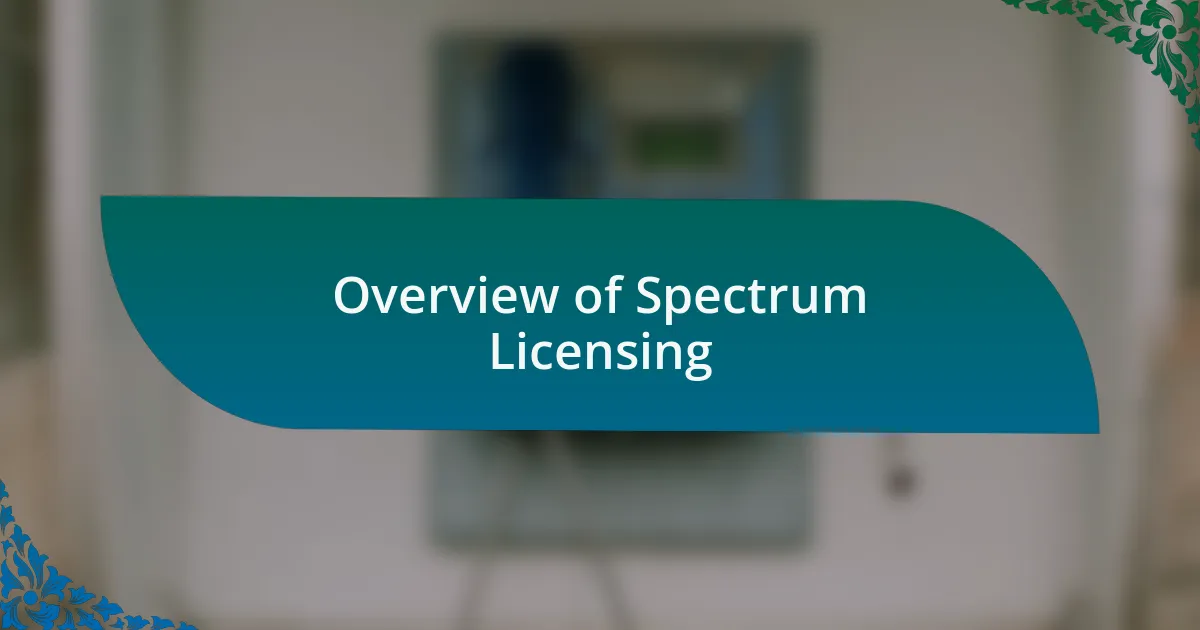
Overview of Spectrum Licensing
Spectrum licensing is a critical aspect of telecommunications that ensures efficient use of radio frequencies. My own journey navigating this landscape revealed just how intricate and sometimes perplexing these regulations can be. Have you ever wondered how a simple mobile call travels through the air? It starts with the licensing of spectrum, allowing companies to operate on specific frequencies without interference.
As I delved deeper into spectrum licensing, I found that these licenses are awarded by government agencies, often through auctions that can escalate quickly in terms of cost and competition. I recall sitting in on a licensing auction, feeling the adrenaline build as bids soared. It struck me how these decisions impact the market and, ultimately, us, the consumers. This process not only shapes the future of telecom services but also affects the pricing and availability of innovations that we all rely on daily.
The emotional weight of spectrum licensing cannot be understated; it defines the very foundation of communication networks. It’s fascinating yet daunting that a few megahertz can dictate the service quality and coverage we experience. Have you felt the frustration of dropped calls or slow internet speed? Those moments often trace back to the availability and management of spectrum licenses. Understanding this dynamic is crucial for anyone invested in the telecom sector.
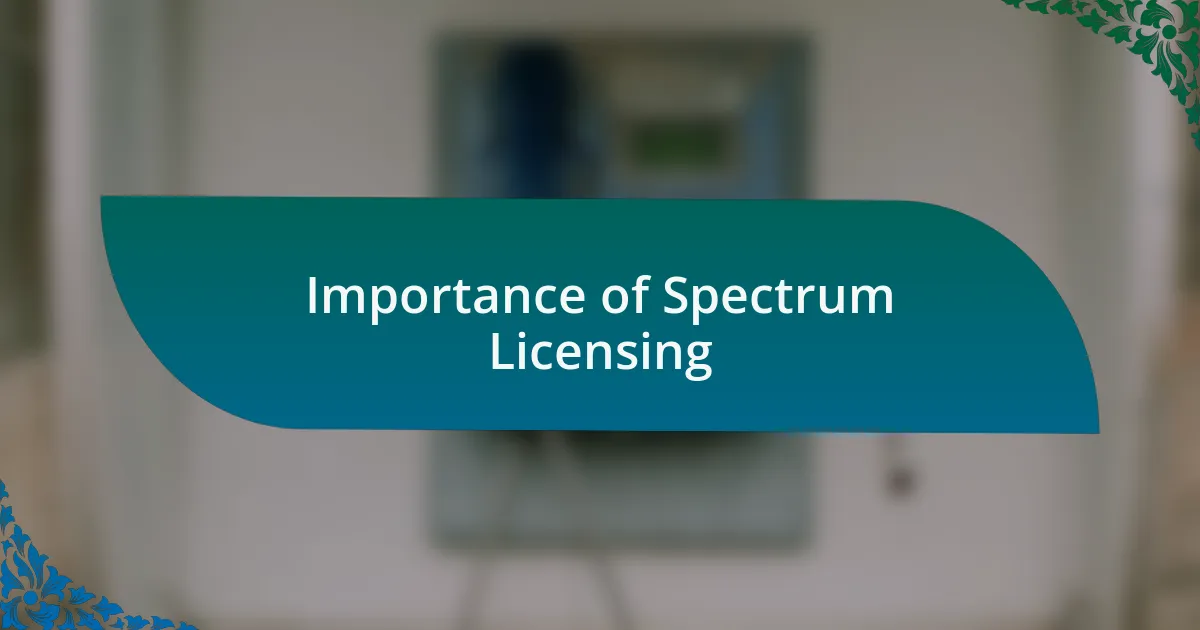
Importance of Spectrum Licensing
Spectrum licensing is vital because it guarantees that the radio frequencies used for communication are allocated fairly and efficiently. From my own experience, I recall the tension during a network outage—we often took for granted the seamless communications we enjoy until they were disrupted. It dawned on me that such interruptions often trace back to spectrum management issues, illustrating how crucial these licenses are to maintaining reliable services.
Moreover, the role of spectrum licensing extends beyond just preventing interference; it fosters competition among service providers. I remember the excitement of a new provider entering our market, promising better coverage and pricing due to their secured licenses. This competition not only benefits consumers but also drives innovation, pushing existing companies to enhance their services. Don’t you think it’s fascinating how such a structured process behind the scenes can spark breakthroughs in technology?
We can’t overlook the socioeconomic impact that spectrum licensing has on communities. In my town, the expansion of wireless services thanks to newly auctioned spectrum directly correlated with improved access to education and healthcare resources. It’s hard not to feel a sense of responsibility when discussing these licenses; they hold the power to bridge gaps and create opportunities for people. Isn’t it essential that we recognize the significance of such decisions in shaping our daily lives?
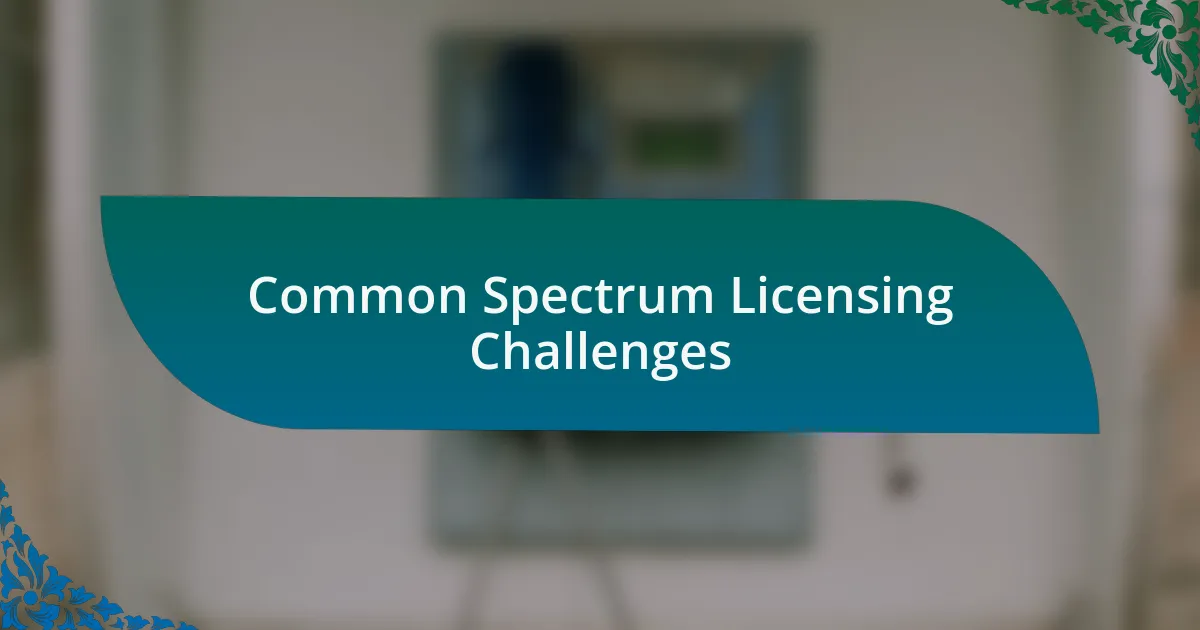
Common Spectrum Licensing Challenges
Navigating the world of spectrum licensing often feels like trying to solve a complex puzzle. I’ve encountered challenges such as incomplete applications or conflicting interests among multiple stakeholders, which can delay critical projects. Have you ever had that sinking feeling when you realize paperwork isn’t enough to ensure smooth communication? It’s frustrating, especially when the tech world moves at lightning speed and every minute matters.
Another common issue is the ambiguity around regulatory changes. I still remember a project I was involved in where shifts in policy left us scrambling to adjust our strategies. It’s like trying to catch a moving train—just when you think you have everything lined up, something changes, and you must rethink your entire approach. How often do we find ourselves caught off guard by new rules that seem to come out of nowhere? This uncertainty can really stifle innovation and make it hard for companies to plan for the future.
Lastly, I’ve seen firsthand the difficulties that arise from competing claims on spectrum. There’s a sense of unease when two parties believe they have rights to the same frequency. I recall a situation where negotiations dragged on for months, creating tension not just between companies but impacting consumers too. Isn’t it unsettling to think that a mere frequency could be a point of contention, potentially disrupting services for users? Spectrum licensing can truly become a battleground, highlighting the importance of clear communication and collaboration among all involved.

My Reasons for Choosing Spectrum
Choosing spectrum for my projects was not a decision made lightly. I was drawn to its potential for unlocking innovative solutions in telecommunications. For instance, I vividly recall the moment I realized that selecting the right frequency could influence the quality of service in ways I had never anticipated. Was it really possible that a simple choice could enhance connectivity for thousands? That realization alone steered me toward spectrum as a critical component of my work.
I also found that investing time in understanding spectrum’s nuances often paid off in unexpected ways. One experience that stands out involved navigating a licensing agreement where having pre-existing knowledge of spectrum allocation helped me negotiate better terms, ultimately leading to smoother project execution. How many times have we wished we had a roadmap before embarking on a challenging route? In this context, familiarity with spectrum became my guide, illuminating opportunities I hadn’t previously considered.
The community aspect of spectrum licensing cannot be overlooked. Many times, I’ve connected with fellow industry professionals who shared their spectrum journeys, enriching my understanding of collective challenges and strategies. It’s almost like being part of a club—one where shared experiences can reveal insights that data alone cannot. Does it strike you as essential to learn from others when navigating complex terrain? I wholeheartedly believe collaboration is key.
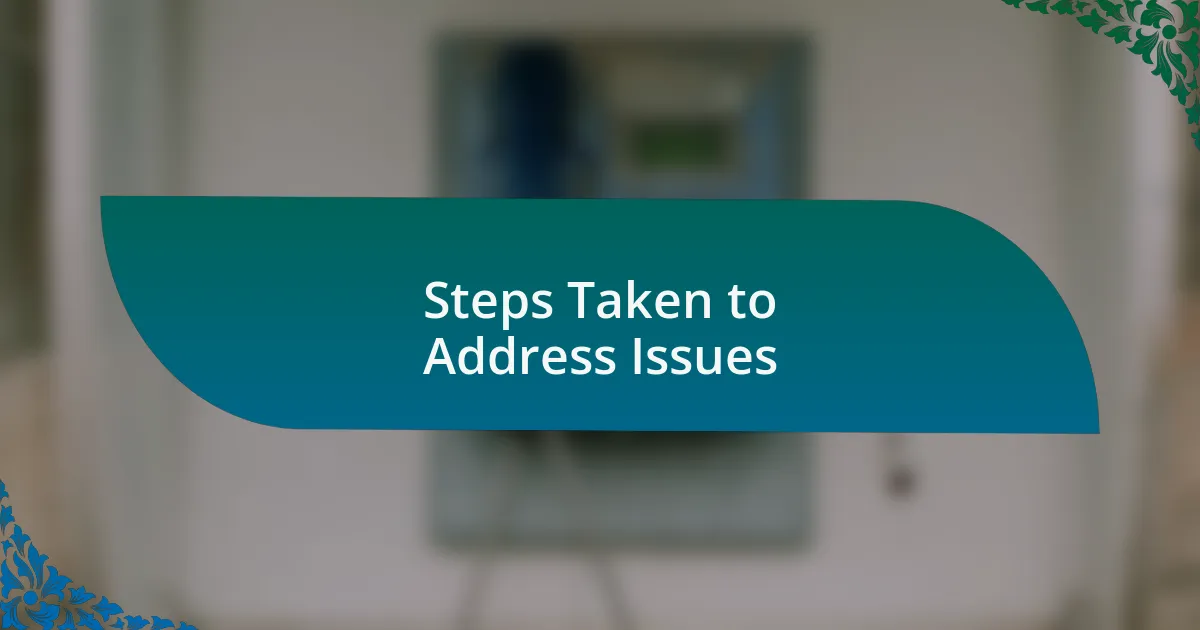
Steps Taken to Address Issues
Addressing the licensing issues I faced wasn’t just about fixing problems; it was an iterative learning process. I remember when I first encountered a significant setback—a delay in acquiring necessary licenses. Rather than panic, I chose to engage with regulatory bodies directly. By fostering open communication and expressing my concerns, I discovered pathways to expedite the licensing process. Has anyone else felt that sinking feeling when confronted with red tape? I certainly did, but maintaining dialogue turned things around more quickly than I expected.
Another step that proved invaluable was seeking out expert advice. There was a moment when I hit a wall and realized I needed external insight. Consulting with an industry veteran yielded new perspectives on compliance that I hadn’t considered before. Have you ever had that “aha” moment where someone else’s experience reshaped your understanding? It felt invigorating to apply their advice, which not only resolved the immediate issues but also equipped me with tools for future challenges.
Finally, I initiated collaborations with peers who faced similar hurdles. I vividly recall a brainstorming session where we collectively mapped out potential solutions, which unveiled strategies none of us had thought of individually. Isn’t it intriguing how sharing obstacles can transform them into opportunities? This collaborative spirit not only addressed our issues but helped build a strong support network, making the journey feel less isolating.

Lessons Learned from My Experience
Navigating the complexities of spectrum licensing taught me the importance of patience and resilience. There were moments when I felt overwhelmed, particularly during the initial stages, grappling with the sheer volume of regulations. I remember sitting in my home office, staring at a mountain of paperwork, wondering if I’d ever make progress. Yet, I learned to view each setback as a stepping stone, a chance to refine my approach and build my understanding.
One pivotal lesson was the necessity of thorough research before diving into the licensing procedure. I can’t emphasize enough how my initial lack of knowledge led to avoidable mistakes, costing time and resources. After a frustrating initial attempt, I took the time to immerse myself in available resources, from government guides to online forums. Have you ever committed to understanding something deeply only to realize how much you didn’t know? The transformation was eye-opening, shaping how I approached subsequent applications.
Moreover, I discovered the value of cultivating relationships within the industry. Early on, I was hesitant to network, fearing that my inexperience would show. However, as I began attending industry events and engaging with professionals, I realized how sharing stories and experiences could illuminate the often murky path of licensing. I vividly recall a conversation with a fellow entrepreneur who shared their licensing pitfalls and triumphs. Their honesty reassured me that the struggle is common—and honestly, it reinforced my resolve to keep pushing forward.
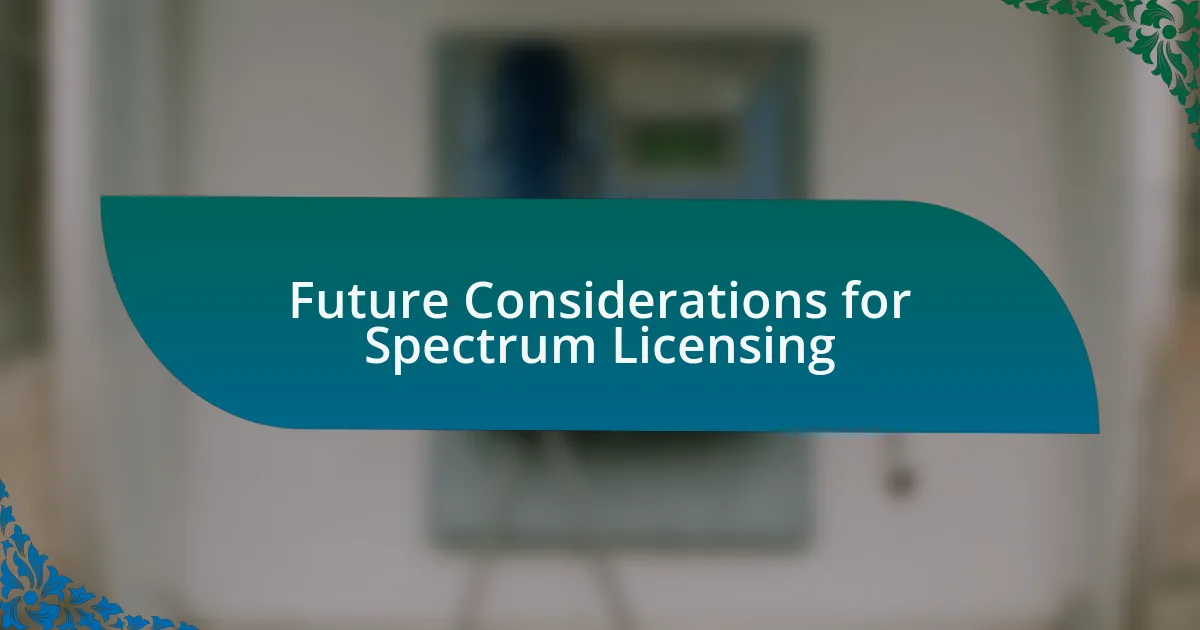
Future Considerations for Spectrum Licensing
When I think about the future of spectrum licensing, I can’t help but wonder how emerging technologies will shape its landscape. The growing demand for wireless communication and the rise of innovations like 5G and IoT (Internet of Things) mean that licensing must evolve. Can we keep pace with the rapid advancements? My concern lies in whether regulators will adapt their frameworks fast enough to accommodate these changes.
I’ve come to realize that collaboration will be key in future licensing strategies. As different industries vie for spectrum access, it’s crucial for stakeholders to work together to maximize efficiency. I still remember an industry panel I attended where thought leaders discussed co-sharing models. Their insights made me appreciate how partnerships can pave the way for more flexible and dynamic licensing arrangements.
Furthermore, I believe education and awareness will play a transformative role moving forward. Many new players entering the field may not fully grasp the complexities of licensing, which can lead to unfortunate missteps. I felt that pinch personally when I first started out. As educational initiatives expand, they could help bridge this knowledge gap, ensuring that all stakeholders can navigate the intricate world of spectrum licensing with confidence.